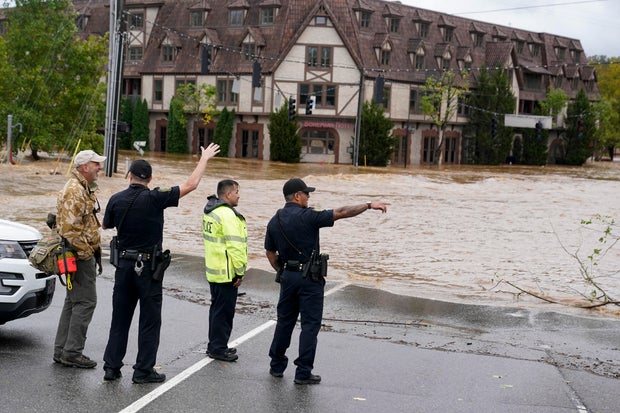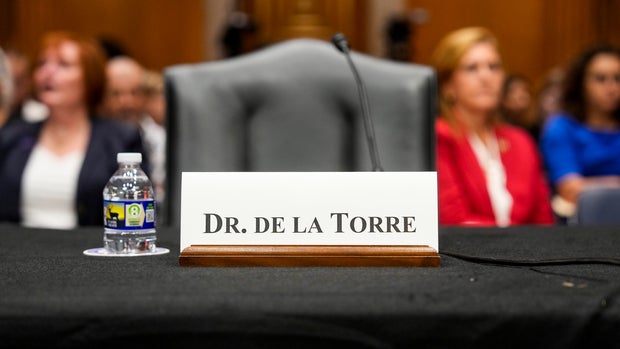CBS News
Nonprofit offers Indian women cash, other assistance to deal with effects of extreme heat

Thousands of low-income women in India are receiving assistance to deal with the economic and health effects of the deadly triple-digit temperatures gripping the country.
Climate Resilience for All, a nonprofit dedicated to protecting people from the impacts of extreme heat, announced on Wednesday that it will provide 50,000 women in India with a financial package “that combines insurance, cash for lost income and soon, an early warning system.”
The group said that the triple-digit temperatures of recent weeks have already triggered some payments. Every single one of the 50,000 women received about $5 in cash assistance, or about 83.52 Indian rupees, as every district reached 104 degrees Fahrenheit.
Women who are enrolled in the nonprofit’s Women’s Climate Shock Insurance and Livelihoods Initiative received additional help. That program is offered to those in the Self-Employed Women’s Association (SEWA) whose “outdoor work can lead to chronic rashes, dizziness, burns, infections, and miscarriage, as well as loss of crops or merchandise that results in economic disaster at a household level,” the nonprofit said.
Arunaben Makwana, one of the women who received financial assistance from Climate Resilience for All, said in a released statement that “the money from the program has allowed me to pay for my medical expenses and to buy food for my family.”
Kathy Baughman McLeod, CEO of the nonprofit, said the program was one of the first of its kind and that the need will only increase as global temperatures get worse and continue to have devastating impacts on people across the world.
“There is one thing pushing SEWA women further into poverty and that is climate change,” she said. “This program offers choice and opportunity in spite of extreme heat.”
Under their initiative, women across 22 districts in India received the additional financial assistance in the form of insurance payments. In all, 92% of the 50,000 recipients receive insurance assistance. The highest insurance payout was $19.80 (1,653.73 Indian rupees) per person in the country’s Dungarpur district, with women in other districts receiving an average of $7.38, the nonprofit said.
Temperatures across Asia, especially in the Indian subcontinent, have been punishing this summer. In fact, the summer in much of Asia —including in India, Bangladesh, Myanmar, Philippines, Thailand, and Vietnam— arrived in spring itself when temperatures set records in late April and early May, clocking above 110 degrees Fahrenheit. The heat waves, which are a regular annual affair in the Asia Pacific region, were worsened by the El Niño weather phenomenon this year.
The heat in late May and June so far has been scorching India, where more than 100 people have died in the past month because of heat strokes and other heat-related causes. The temperatures in the Indian capital, New Delhi, and dozens of other cities crossed 122 degrees Fahrenheit at least twice this month, but have been above 113 Fahrenheit consistently for weeks. Scientists say besides the high day temperatures, the long duration of heat waves and higher night temperatures have worse effects on human bodies that don’t get enough cooling time.
The Indian Meteorological Department this week confirmed that this has been the longest heat wave spell: 24 days in different parts of the country. The heat wave has also triggered a water crisis in many parts of India, including in New Delhi, where people are coping with the shortage with trucked-in supplies, which they often have to pay for.
Climate Resilience for All says its program is aiming to expand to more communities across India and Africa in the coming year.
“Every dollar invested in women’s health yields three in economic activity,” the nonprofit said.
CBS News
North Carolina’s Asheville devastated after Helene’s damage cuts power, floods roads

Floodwaters pushed by the remnants of Hurricane Helene left North Carolina’s largest mountain city largely cut off Saturday by damaged roads and a lack of power and cellphone service, part of a swath of destruction across southern Appalachia that left an unknown number dead and countless worried relatives unable to reach loved ones.
In North Carolina alone, more than 400 roads remained closed on Saturday as floodwaters began to recede and reveal the extent of damage. North Carolina Gov. Roy Cooper said that supplies were being airlifted to that part of the state. Cooper said two people died in his state, Helene killed at least 52 people across multiple states.
Among those rescued from rising waters was nurse Janetta Barfield, whose car was swamped on Friday morning as she left an overnight shift at Asheville’s Mission Hospital. She said she watched a car in front of her drive through standing water and thought it was safe to proceed. But her car stalled, and within minutes water had filled her front seat up to her chest. A nearby police officer who saw her car stall helped her to safety.
“It was unbelievable how fast that creek got just in like five minutes,” Barfield said.
Erik Verduzco / AP
Early on Saturday morning, many gas stations were closed because they didn’t have electricity, and the few that were open had hourlong lines wrapped around the block. The hub of tourism and arts, home to about 94,000 people, was unusually still after floodwaters swamped neighborhoods known for drawing visitors including Biltmore Village and the River Arts District, which is home to numerous galleries, shops and breweries.
More than 700,000 power customers were without power across North Carolina, including 160,000 in Buncombe County. Interstate 40 and I-26 were impassible in multiple locations, and a state transportation department map showed that most routes into Asheville and across much of the mountains were snarled. North Carolina’s Department of Transportation posted on social media on Saturday afternoon that “all roads in Western North Carolina should be considered closed.”
In Asheville, there was no cellular service and no timeline for when it would be restored.
“We have had some loss of life,” County Emergency Services Director Van Taylor Jones told reporters. However, he said they were not ready to report any specifics. Officials have been hindered in contacting next of kin by the communications outages. Asheville police instituted a curfew from 7:30 p.m. Friday to 7:30 a.m. Saturday.
“The curfew is to ensure the public’s safety and will be in effect until further notice,” police said.
Asheville transit services were also suspended, police said. The city advised residents to boil “all water used for human consumption,” as there was at least one significant water line break during the storm. Many residents might not be getting water or reduced or no pressure water.
Jones said the area experienced a cascade of emergencies that included heavy rain, high winds and mudslides. Officials said they tried to prepare for the storm but its magnitude was beyond what they could have imagined.
“It’s not that we (were) not prepared, but this is going to another level,” Sheriff Quentin Miller said. “To say this caught us off-guard would be an understatement.”
Erik Verduzco / AP
Atlanta resident Francine Cavanaugh said she has been unable to reach her sister, son, or friends in the Asheville area.
“My sister checked in with me yesterday morning to find out how I was in Atlanta,” she said on Saturday. “The storm was just hitting her in Asheville, and she said it sounded really scary outside.”
Cavanaugh said her sister had no idea how bad the storm would be there. She told Cavanaugh she was going to head out to check on guests at a vacation cabin “and that’s the last I heard of her. I’ve been texting everyone that I know with no response. All phone calls go directly to voicemail.”
CBS News
Embattled Steward Health Care CEO Ralph de la Torre to resign

The CEO of a hospital operator that filed for bankruptcy protection in May will step down after failing to testify before a U.S. Senate panel.
Steward Health Care CEO Ralph de la Torre has overseen a network of some 30 hospitals around the country. The Texas-based company’s troubled recent history has drawn scrutiny from elected officials in New England, where some of its hospitals are located.
A spokesperson for de la Torre told the Associated Press Saturday that he “has amicably separated from Steward on mutually agreeable terms” and “will continue to be a tireless advocate for the improvement of reimbursement rates for the underprivileged patient population.”
A CBS News investigation that spanned nearly two years documented how private equity investors and de la Torre extracted hundreds of millions of dollars while healthcare workers and patients struggled to get the life-saving supplies they needed.
In August, the company closed two Massachusetts hospitals, leaving about 1,200 workers jobless, according to the state.
Sen. Bernie Sanders of Vermont, who chairs the Senate Health, Education, Labor and Pensions Committee, said earlier this month that Congress “will hold Dr. de la Torre accountable for his greed and for the damage he has caused to hospitals and patients throughout America.”
De la Torre’s resignation is effective Oct. 1. The Senate approved a resolution on Wednesday that was intended to hold him in criminal contempt for failing to testify before a committee.
The Senate panel has been looking into Steward’s bankruptcy. De la Torre did not appear before it despite being issued a subpoena. The resolution refers the matter to a federal prosecutor.
Kayla Bartkowski/The Boston Globe via Getty Images
CBS News
Climate Watch: Protecting the Planet | How climate change threatens plant and animal species

Watch CBS News
Be the first to know
Get browser notifications for breaking news, live events, and exclusive reporting.











